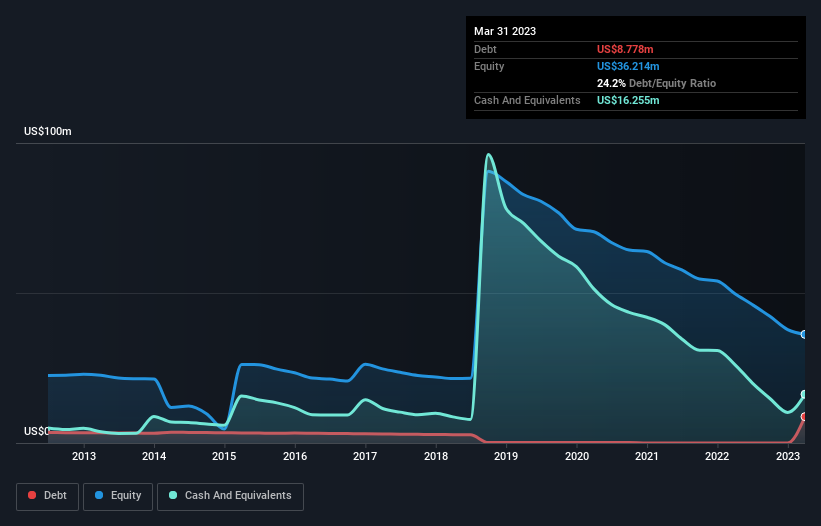- United States
- /
- Medical Equipment
- /
- NasdaqGS:APYX
Does Apyx Medical (NASDAQ:APYX) Have A Healthy Balance Sheet?
Some say volatility, rather than debt, is the best way to think about risk as an investor, but Warren Buffett famously said that 'Volatility is far from synonymous with risk.' When we think about how risky a company is, we always like to look at its use of debt, since debt overload can lead to ruin. Importantly, Apyx Medical Corporation (NASDAQ:APYX) does carry debt. But should shareholders be worried about its use of debt?
What Risk Does Debt Bring?
Debt is a tool to help businesses grow, but if a business is incapable of paying off its lenders, then it exists at their mercy. If things get really bad, the lenders can take control of the business. However, a more frequent (but still costly) occurrence is where a company must issue shares at bargain-basement prices, permanently diluting shareholders, just to shore up its balance sheet. Having said that, the most common situation is where a company manages its debt reasonably well - and to its own advantage. The first thing to do when considering how much debt a business uses is to look at its cash and debt together.
View our latest analysis for Apyx Medical
How Much Debt Does Apyx Medical Carry?
You can click the graphic below for the historical numbers, but it shows that as of March 2023 Apyx Medical had US$8.78m of debt, an increase on none, over one year. But it also has US$16.3m in cash to offset that, meaning it has US$7.48m net cash.

How Healthy Is Apyx Medical's Balance Sheet?
According to the last reported balance sheet, Apyx Medical had liabilities of US$18.5m due within 12 months, and liabilities of US$2.04m due beyond 12 months. Offsetting these obligations, it had cash of US$16.3m as well as receivables valued at US$18.1m due within 12 months. So it can boast US$13.8m more liquid assets than total liabilities.
This short term liquidity is a sign that Apyx Medical could probably pay off its debt with ease, as its balance sheet is far from stretched. Simply put, the fact that Apyx Medical has more cash than debt is arguably a good indication that it can manage its debt safely. There's no doubt that we learn most about debt from the balance sheet. But ultimately the future profitability of the business will decide if Apyx Medical can strengthen its balance sheet over time. So if you want to see what the professionals think, you might find this free report on analyst profit forecasts to be interesting.
Over 12 months, Apyx Medical made a loss at the EBIT level, and saw its revenue drop to US$44m, which is a fall of 16%. We would much prefer see growth.
So How Risky Is Apyx Medical?
We have no doubt that loss making companies are, in general, riskier than profitable ones. And in the last year Apyx Medical had an earnings before interest and tax (EBIT) loss, truth be told. And over the same period it saw negative free cash outflow of US$18m and booked a US$21m accounting loss. But at least it has US$7.48m on the balance sheet to spend on growth, near-term. Overall, its balance sheet doesn't seem overly risky, at the moment, but we're always cautious until we see the positive free cash flow. The balance sheet is clearly the area to focus on when you are analysing debt. However, not all investment risk resides within the balance sheet - far from it. For example, we've discovered 3 warning signs for Apyx Medical (1 is a bit unpleasant!) that you should be aware of before investing here.
Of course, if you're the type of investor who prefers buying stocks without the burden of debt, then don't hesitate to discover our exclusive list of net cash growth stocks, today.
New: Manage All Your Stock Portfolios in One Place
We've created the ultimate portfolio companion for stock investors, and it's free.
• Connect an unlimited number of Portfolios and see your total in one currency
• Be alerted to new Warning Signs or Risks via email or mobile
• Track the Fair Value of your stocks
Have feedback on this article? Concerned about the content? Get in touch with us directly. Alternatively, email editorial-team (at) simplywallst.com.
This article by Simply Wall St is general in nature. We provide commentary based on historical data and analyst forecasts only using an unbiased methodology and our articles are not intended to be financial advice. It does not constitute a recommendation to buy or sell any stock, and does not take account of your objectives, or your financial situation. We aim to bring you long-term focused analysis driven by fundamental data. Note that our analysis may not factor in the latest price-sensitive company announcements or qualitative material. Simply Wall St has no position in any stocks mentioned.
About NasdaqGS:APYX
Apyx Medical
An energy technology company, designs, develops, manufactures, and sells electrosurgical equipment and medical devices in the United States and internationally.
Fair value with mediocre balance sheet.
Similar Companies
Market Insights
Community Narratives


Recently Updated Narratives


MINISO's fair value is projected at 26.69 with an anticipated PE ratio shift of 20x


The Quiet Giant That Became AI’s Power Grid


Nova Ljubljanska Banka d.d will expect a 11.2% revenue boost driving future growth
Popular Narratives


The company that turned a verb into a global necessity and basically runs the modern internet, digital ads, smartphones, maps, and AI.


MicroVision will explode future revenue by 380.37% with a vision towards success



